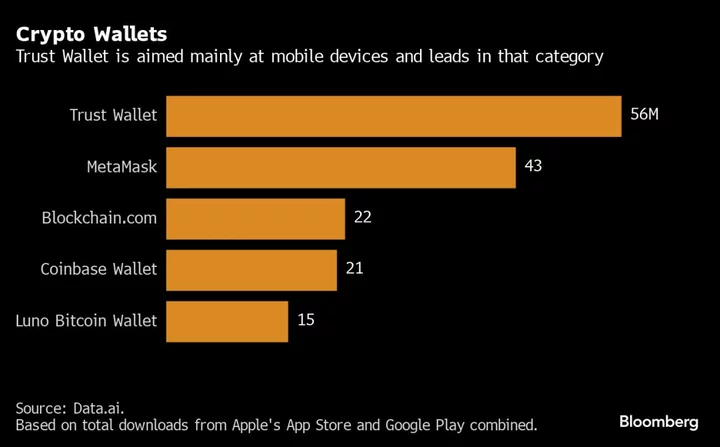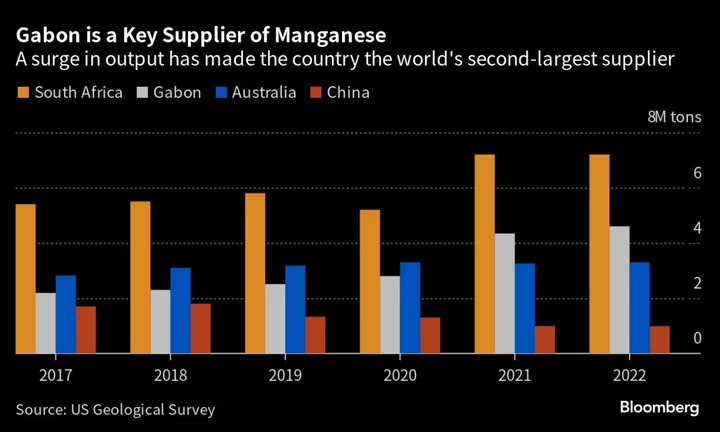Telecom Italia SpA has agreed to sell its landline network to KKR & Co. for as much as €22 billion ($24 billion), moving ahead with a strategic shakeup it’s been weighing for over 15 years — and defying its biggest shareholder.
The phone carrier’s board over the weekend approved the sale, which has the support of the Italian government, and said the accord with the US private equity firm won’t be subject to a shareholder vote. That sets up a direct challenge to French media conglomerate Vivendi SE, the company’s largest investor.
Telecom Italia shares reversed earlier gains in Milan on Monday, falling as much as 4.7% as Vivendi, which owns a 24% stake, reiterated that it will seek to block the deal. Volatility as the shares opened earlier on Monday highlight uncertainty over the outlook for the deal, and what action Vivendi may take.
Paris-based Vivendi said it “will use any legal means at its disposal” to challenge the decision, and the media company has already called for an extraordinary shareholders meeting where it could try to rally support to halt the sale.
What Bloomberg Intelligence Says:
Telecom Italia’s sale of its domestic fixed grid to KKR without a shareholder vote heralds legal drama amid a Vivendi backlash, which has the capacity to hinder a transaction, we think. A high earnout component — 15% of valuation — and the absence of a Sparkle sale cap the attractiveness of the deal for Telecom Italia investors.
If successful, the deal could provide a lifeline for debt-laden Telecom Italia, allowing it to reshape its core business and position itself for future mergers and acquisitions. The slimmed-down carrier could then focus on marketing and selling phone services while the grid, which handles digital, ultra-broadband operations, would be controlled by the US fund under government oversight.
KKR has valued the network at €18.8 billion, but the overall value of the deal would be as much as €22 billion based on what could be earned if the grid is merged with the one owned by smaller rival Open Fiber SpA.
Telecom Italia said it expects to complete the transaction by the summer of 2024 and that the move will allow it to reduce its debt by €14 billion. The company disclosed €26.2 billion in net debt at the end of June, up €0.8 billion compared to the end of last year.
Competitive Market
The deal could now pave the way for other M&A opportunities in the Italian telecommunications sector.
Italy has one of the world’s most competitive telecoms markets, with monthly subscriptions for full-fiber landline services, which usually include unlimited Internet, priced as low as €20 to €25, about a quarter of what most US consumers pay.
Competition has heated up in recent years as new players arrive — notably France’s Iliad SA, which entered the Italian mobile market in 2018, positioning itself as a cutthroat, no-frills specialist and sparking a price war.
Telecom Italia’s board did not approve a separate KKR offer for its subsea cable unit Sparkle, extending a deadline to Dec. 5 to verify the possibility of a higher offer for the division, which had been valued at about €1 billion.
The 11-3 board decision over the weekend marks a victory for Telecom Italia Chief Executive Officer Pietro Labriola, the main architect of the network sale plan.
It’s also an outcome that will be welcomed by Prime Minister Giorgia Meloni’s administration. The deal could allow the ex-phone monopoly to slash its debt while also giving Rome a degree of oversight over an asset it’s long insisted is strategic.
Finance Minister Giancarlo Giorgetti on Monday reiterated the state’s position on the network, saying that while Vivendi is free to exercise its rights as a shareholder, the government backs the Telecom Italia plan, Ansa news agency reported.
Telecom Italia has been trying to sell the grid for months, following years of discussions. The idea of separating the network from the commercial unit was first floated in the early 2000s. While the company is privately owned, Meloni’s government and the administration of her predecessor Mario Draghi both played key roles in engineering a deal that would allow the state to maintain influence.
Italy is set to get a 20% stake in the network unit as part of the deal, and Meloni has set aside up to €2.5 billion to invest in the company.
Board approval looked uncertain as recently as the end of last month, after London-based investment firm Merlyn Advisors Ltd. presented a surprise plan to halt the sale and to replace Labriola.
While Merlyn only owns about 0.006% of Telecom Italia, Vivendi latched onto its proposal as part of its campaign to value the grid at a higher level, at least €30 billion. Merlyn said after the Telecom Italia announcement that it will also pursue legal action to halt the sale.
--With assistance from Giulia Morpurgo and Chiara Remondini.
(Updates with debt figures. A previous version of the story was corrected to remove a graphic based on errant data.)









